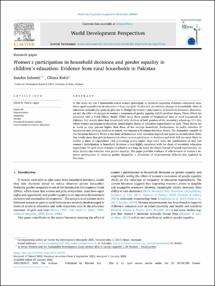Women’s participation in household decisions and gender equality in children’s educationEvidence from rural households in Pakistan

Women’s participation in household decisions and gender equality in children’s education
Evidence from rural households in Pakistan

| dc.contributor.author | Saleemi, Sundus | |
| dc.contributor.author | Kofol, Chiara | |
| dc.date.accessioned | 2023-02-08T06:52:43Z | |
| dc.date.available | 2023-02-08T06:52:43Z | |
| dc.date.issued | 29.01.2022 | |
| dc.identifier.uri | https://hdl.handle.net/20.500.11811/10623 | |
| dc.description.abstract | In this study we test if households where women participate in decisions regarding children’s education incur more equal expenditures on education of boys and girls. To this end, we estimate changes in households’ share of education expenditures spent on girls due to changes in women’s participation in household decisions. Moreover, we test the effect of changes in women’s awareness of gender equality (AGE) on these shares. These effects are estimated with a Fixed Effects Model (FEM) using three rounds of longitudinal data of rural households in Pakistan. Our results show that households with children of both genders of the secondary school-age (11–16), where women participate in decisions, spend higher shares of education expenditures on girls. These shares are as much as sixty percent higher than those of the average household. Furthermore, to tackle selection of households into sending children to school, we estimate a Heckman Selection Model. The dependent variable of the Heckman Selection Model is the share of household total education expenditure spent on an individual child. Our results show that girls in households where women participate in decisions and with AGE are more likely to receive a share of expenditure 12.6 percentage points higher than boys. Also, the combination of AGE and women’s participation in household decisions is also highly correlated with the share of secondary education expenditure for girls when distance to school is not long. By using the shares instead of actual expenditures, we show factors that correlate with gender equality. The paper provides evidence of effectiveness of women’s decision participation in reducing gender inequality, a dimension of empowerment hitherto less explored in literature. | en |
| dc.format.extent | 15 | |
| dc.language.iso | eng | |
| dc.rights | Namensnennung - Nicht kommerziell - Keine Bearbeitungen 4.0 International | |
| dc.rights.uri | http://creativecommons.org/licenses/by-nc-nd/4.0/ | |
| dc.subject | Empowerment | |
| dc.subject | Inequality | |
| dc.subject | Gender | |
| dc.subject | Household decision-making | |
| dc.subject | Intra-household resource allocation | |
| dc.subject.ddc | 330 Wirtschaft | |
| dc.subject.ddc | 370 Erziehung, Schul- und Bildungswesen | |
| dc.subject.ddc | 640 Hauswirtschaft und Familienleben | |
| dc.title | Women’s participation in household decisions and gender equality in children’s education | |
| dc.title.alternative | Evidence from rural households in Pakistan | |
| dc.type | Wissenschaftlicher Artikel | |
| dc.publisher.name | Elsevier | |
| dc.rights.accessRights | openAccess | |
| dc.relation.eissn | 2452-2929 | |
| dcterms.bibliographicCitation.volume | 2022, vol. 25 | |
| dcterms.bibliographicCitation.issue | Art. 100395 | |
| dcterms.bibliographicCitation.pagestart | 1 | |
| dcterms.bibliographicCitation.pageend | 15 | |
| dc.relation.doi | https://doi.org/10.1016/j.wdp.2022.100395 | |
| dcterms.bibliographicCitation.journaltitle | World Development Perspectives | |
| ulbbn.pubtype | Zweitveröffentlichung | |
| dc.version | publishedVersion | |
| ulbbn.sponsorship.oaUnifund | OA-Förderung Universität Bonn |
Dateien zu dieser Ressource
Das Dokument erscheint in:
-
Publikationen (16)




